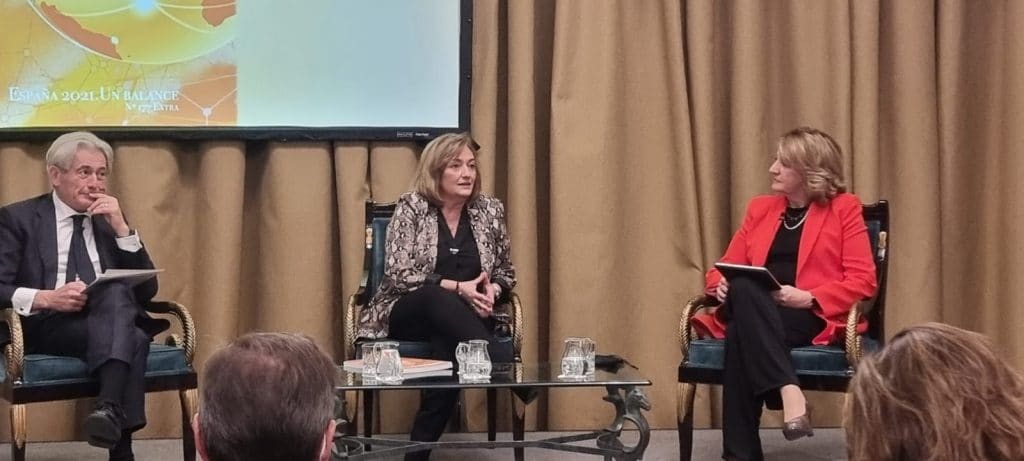The President of the Independent Authority for Fiscal Responsibility (AIReF), Cristina Herrero, took part today in the presentation of the extraordinary issue of “España 2021. Un balance” [Spain 2021. An overview] of the journal Economistas edited by the Association of Economists of Madrid. At the event, organised by the General Council of Economists and the Association of Economists of Madrid, Cristina Herrero reviewed the evolution of the economy in 2021 and highlighted the importance of making economic analyses in a context of high uncertainty such as the current one.
At the event, in which the Dean-President of the Association of Economists of Madrid, Amelia Pérez Zabaleta, and the President of the General Council of Economists, Valentín Pich, also participated, Cristina Herrero stressed the importance of having specialised publications such as this journal, which the Association has been publishing since April 1983. The special issue published by the Association each year brings together an analysis and assessment of the Spanish economy in the previous year and the outlook for the current year.
During the discussion, Cristina Herrero talked with Amelia Pérez Zabaleta and Valentín Pich about AIReF’s evaluation function, which has been boosted following the creation of the new Public Spending Evaluation Division at the institution. This new division fulfils one of the commitments of the 2020-2026 Strategic Plan and a milestone of the Recovery, Transformation and Resilience Plan (RTRP). They also discussed the changes driven by the evaluations already published by AIReF.
The President of AIReF also referred to the succession of external shocks that have dominated the international scene since 2020, such as the health crisis that began in 2020, the disruptions in value chains and the increase in the price of energy supplies in 2021, and the armed conflict in 2022. In this regard, she highlighted the difficulty of making forecasts in this shifting context and said that AIReF will review its macroeconomic and fiscal figures again on April 7th, when it publishes the Report on Initial Budgets. In addition, if the circumstances change once more, the scenario will be updated again for the publication of the Report on the Stability Programme Update in early May.
Cristina Herrero also referred to the effect of the rise in inflation on the public accounts, with an initial positive and automatic effect of an increase in revenue. However, this will not be maintained over time and will gradually fade out as expenditure also incorporates the effect of inflation. In addition, the cost of the measures to be implemented to mitigate the effects of the armed conflict on society and the economy will need to be evaluated.
Finally, she spoke with Amelia Pérez Zabaleta and Valentín Pich about monetary policy, the most significant reforms at this time for the sustainability of public finances and the resources channelled through the EU to deal with the consequences of COVID-19 and transform European economies. These funds represent unprecedented financing in terms of both their characteristics and their amount, since they total 750 billion euros (5% of the EU’s GDP).







